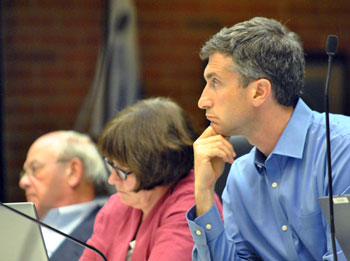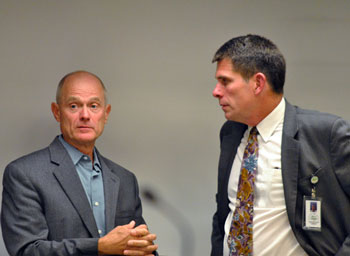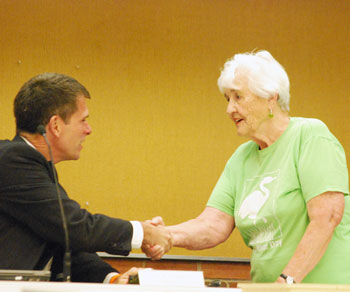Column: Connecting Barracuda, Coin Flips
Early in October, Barracuda Networks invited a bunch of University of Michigan students to a “hackathon” at the computer science and engineering building, where they programmed computers to play games against each other.

Figure 1. Participants in Barracuda’s hackathon programmed their computers to play a game based on a 7×7 grid of squares. The game can also be played between human beings using pen and paper. The basic idea can be described as trying to join two opposite sides of the grid with a connected path consisting of squares you “own.” This image depicts the state of a game board resulting in an agreed-upon draw between an Ann Arbor city councilmember (pink squares, horizontal) and Chronicle editor Dave Askins (green squares, vertical). (Grid by The Chronicle.)
And 24 hours later, the winning team of programmers was handed one of those goofy Publishers-Clearinghouse-style giant checks – for $3,141.59. Second place was $1,414.21. And third place was $602.21.
Those dollar amounts might strike you as funny – because you think they make no sense, or because you think they make perfect sense. But a regular Chronicle reader might look at those numbers without laughing, and calculate as follows: The sum of the prize money is $5,158.01 – which divides perfectly (12 times) into the estimated 61,896.12 total value of a five-year tax abatement recently granted by the city of Ann Arbor to Barracuda. Uncanny, no?
It’s the tax abatement that has resulted in relatively frequent mentions of Barracuda in The Chronicle over the last few months. The process for granting such an abatement includes four separate actions by the city council. So it was the council’s action that The Chronicle was covering, more than anything Barracuda itself was doing.
Now, I confess that I fudged the estimated value of the tax abatement, to get the math to work out. The numbers provided by the city of Ann Arbor’s financial staff pegged the value of the tax abatement at around $61,000 – nothing so precise as $61,896.12. Still, there is an actual connection between the tax abatement and the roomful of UM students who were participating in Barracuda’s 24-hour competition.
That connection relates to a condition of the tax abatement. To receive the tax advantage, Barracuda must add another 144 employees (a perfect square? seriously?) to its Ann Arbor operation. And to make room for all those additional employees, Barracuda’s operation is moving from its current Depot Street location to the old Borders corporate headquarters in downtown Ann Arbor – off Maynard Street, under the parking structure.
The hackathon event was part of the company’s strategy to recruit new employees. [Full Story]






